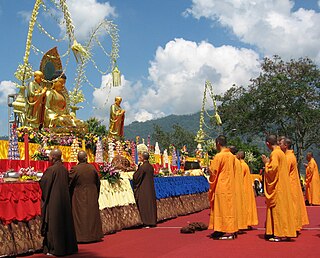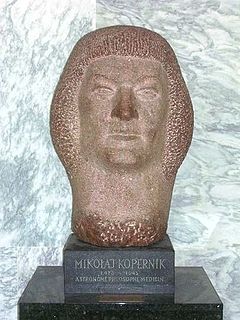
Vesak, also known as Buddha Jayanti, Buddha Purnima and Buddha Day, is a holiday traditionally observed by Buddhists in South Asia and Southeast Asia as well as Tibet and Mongolia. The festival commemorates the birth, enlightenment (Nibbāna), and death (Parinirvāna) of Gautama Buddha in Theravada, Tibetan Buddhism and Navayana.

A developed country is a sovereign state that has a high quality of life, developed economy and advanced technological infrastructure relative to other less industrialized nations. Most commonly, the criteria for evaluating the degree of economic development are gross domestic product (GDP), gross national product (GNP), the per capita income, level of industrialization, amount of widespread infrastructure and general standard of living. Which criteria are to be used and which countries can be classified as being developed are subjects of debate. A point of reference of US$20,000 in 2021 USD nominal GDP per capita for the International Monetary Fund (IMF) is a good point of departure, it is a similar level of development to the United States in 1960.

Shigeru Yoshida was a Japanese diplomat and politician who served as prime minister of Japan from 1946 to 1947 and from 1948 to 1954. Yoshida was one of the longest-serving Japanese prime ministers, and is the third-longest serving prime minister of post-occupation Japan.

The Treaty of San Francisco, also called the Treaty of Peace with Japan, re-established peaceful relations between Japan and the Allied Powers on behalf of the United Nations by ending the legal state of war and providing for redress for hostile actions up to and including World War II. It was signed by 49 nations on 8 September 1951, in San Francisco, California, U.S. at the War Memorial Opera House. Italy and China were not invited, the latter due to disagreements on whether the Republic of China or the People's Republic of China represented the Chinese people. Korea was also not invited due to a similar disagreement on whether South Korea or North Korea represented the Korean people.

The Japanese Peace Bell is a bell donated to the United Nations Headquarters in New York City via the United Nations Association of Japan in June 1954. It is a bonsho that is 60 centimeters in diameter, 1 meter in height, and 116 kg in weight. It was established by Chiyoji Nakagawa.

The Peace Palace is an international law administrative building in The Hague, the Netherlands. It houses the International Court of Justice, the Permanent Court of Arbitration (PCA), The Hague Academy of International Law and the Peace Palace Library.

A bell is a directly struck idiophone percussion instrument. Most bells have the shape of a hollow cup that when struck vibrates in a single strong strike tone, with its sides forming an efficient resonator. The strike may be made by an internal "clapper" or "uvula", an external hammer, or—in small bells—by a small loose sphere enclosed within the body of the bell.
Shōichi Nakagawa was a Japanese conservative politician in the Liberal Democratic Party (LDP), who served as Minister of Finance from 24 September 2008 to 17 February 2009. He previously held the posts of Minister of Economy, Trade and Industry and Ministry of Agriculture, Forestry and Fisheries in the cabinet of Junichiro Koizumi. He was regarded as one of Japan's most attractive public figures. On 4 October 2009, he was found dead in his Tokyo apartment. The cause of his death is yet to be determined; although no suicide note was found, there was also no indication of foul play.

The International Day of Peace, also officially known as World Peace Day, is a United Nations-sanctioned holiday observed annually on 21 September. It is dedicated to world peace, and specifically the absence of war and violence, such as might be occasioned by a temporary ceasefire in a combat zone for humanitarian aid access. The day was first celebrated in 1981 and is kept by many nations, political groups, military groups, and people.

The World Pool-Billiard Association (WPA) is the international governing body for pool. It was formed in 1987, and was initially headed by a provisional board of directors consisting of representatives from Japan, the United States, Sweden, and Germany. as of February 2019, the WPA president is Ian Anderson of Australia. It is an associate of the World Confederation of Billiards Sports (WCBS), the international umbrella organization that encompasses the major cue sports.

After the Japan–PRC Joint Communiqué in 1972, Japan no longer recognizes the Republic of China as the sole official government of China. However, Japan has maintained non-governmental, working-level relations with Taiwan.

The United Nations Art Collection is a collective group of artworks and historic objects donated as gifts to the United Nations by its member states, associations, or individuals. These artistic treasures and possessions, mostly in the form of “sculptures, paintings, tapestries and mosaics”, are representative “arts of nations” that are contained and exhibited within the confines of the United Nations Headquarters in New York City, United States, and other duty stations, making the UN and its international territories a "fine small museum".

New Zealand is a founding member of the United Nations, having taken part in 1945 in the United Nations Conference on International Organization in San Francisco.
Zen was introduced in the United States at the end of the 19th century by Japanese teachers who went to America to serve groups of Japanese immigrants and become acquainted with the American culture. After World War II, interest from non-Asian Americans grew rapidly. This resulted in the commencement of an indigenous American Zen tradition which also influences the larger western (Zen) world.

Antimilitarism is a doctrine that opposes war, relying heavily on a critical theory of imperialism and was an explicit goal of the First and Second International. Whereas pacifism is the doctrine that disputes should be settled without recourse to violence, Paul B. Miller defines anti-militarism as "ideology and activities...aimed at reducing the civil power of the military and ultimately, preventing international war". Cynthia Cockburn defines an anti-militarist movement as one opposed to "military rule, high military expenditure or the imposition of foreign bases in their country". Martin Ceadel points out that anti-militarism is sometimes equated with pacificism—general opposition to war or violence, except in cases where force is deemed necessary to advance the cause of peace.

Bonshō, also known as tsurigane or ōgane are large bells found in Buddhist temples throughout Japan, used to summon the monks to prayer and to demarcate periods of time. Rather than containing a clapper, bonshō are struck from the outside, using either a handheld mallet or a beam suspended on ropes.

The Ribbon International is a United Nations non-governmental organization that created a large decorated cloth promoting nuclear disarmament and care and protection of the earth. In an event held on August 4, 1985, panels were connected in an 18 miles (29 km) long strip stretching from the Pentagon into Washington D.C. The event was covered in the film The Ribbon Starts Here by Nigel Noble (1988). Individual sections of the Ribbon are exhibited internationally. In 1991, The Ribbon International became a United Nations Non Governmental Organization. Ribbon events can be held for special designated days such as the International Day of Peace, Earth Day, special prayer days or other events. Panels from the Ribbon were displayed at the United Nations Decade for Women international conference in Nairobi in 1985, and others were used by members of Women for a Meaningful Summit at their demonstration at the Geneva Summit (1985). Ribbons were used at peace demonstrations at the Nevada Nuclear Test Site, and the Horse Creek Missile Silo near Cheyenne, Wyoming, and the Great Peace March for Global Nuclear Disarmament in 1986.

The political status of the Cook Islands and Niue is formally defined as being states in free association within the Realm of New Zealand, which is made up of the Cook Islands, Niue, and New Zealand and its territories, Tokelau and the Ross Dependency. New Zealand carries out defence and foreign affairs on behalf of the two associated states, although some other countries have recognised them as sovereign entities.

Sugar King Park is a municipal park located in Garapan, Saipan, Northern Mariana Islands across from the NMI Museum of History and Culture. The park was named in honor of the "Sugar King" Haruji Matsue, director of the South Seas Development Company.


















